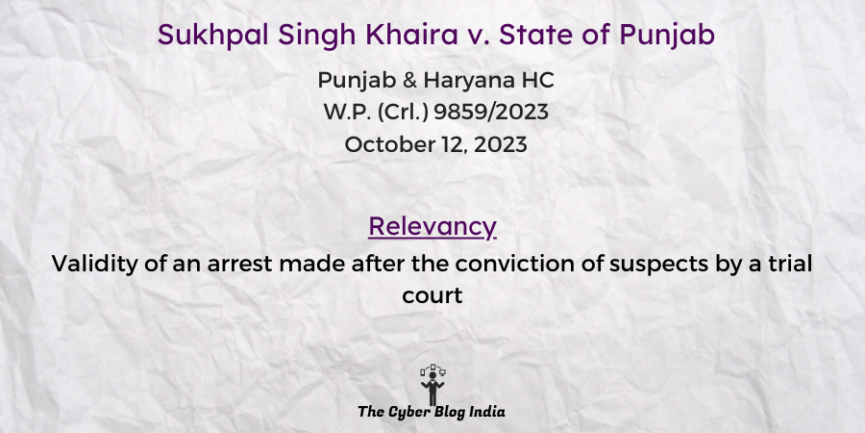Sukhpal Singh Khaira v. State of Punjab

Sukhpal Singh Khaira v. State of Punjab
In the High Court of Punjab & Haryana
W.P. (Crl.) 9859/2023
Before Justice Anoop Chitkara
Decided on October 12, 2023
Relevancy of the case: Validity of an arrest made after the conviction of suspects by a trial court
Statutes and Provisions Involved
- The Arms Act, 1959 (Section 25A)
- The Information Technology Act, 2000 (Section 88)
- The Narcotic Drugs and Psychotropic Substances Act, 1985 (Sections 21,24, 25, 27, 28, 29, 30)
- The Code of Criminal Procedure, 1973 (Sections 173, 319, 439)
Relevant Facts of the Case
- The police registered an FIR against several persons upon recovery of heroin, arms and ammunition during an investigation.
- During the last stage of the trial, the state moved an application for summoning the petitioner as an accused. After the Sessions Judge convicted nine of the ten suspects, he allowed the application and issued non-bailable warrants against the petitioner.
- The petitioner challenged the warrants and the order before the High Court. The Court quashed the warrants but dismissed the revision petitions. The petitioner filed an SLP before the Supreme Court. The Supreme Court bench, in Sukhpal Singh Khaira v. State of Punjab (2022), held that a court could not pass an order under Section 319 once the presiding judge had passed the order of sentence.
- The trial court consequently disposed of the proceedings without prejudice to the investigating agency’s power to investigate the petitioner under Section 173.
- Another SIT was constituted to investigate the FIR, and the petitioner was arrested. The petitioner filed the present petition to challenge the arrest before the High Court.
Prominent Arguments by the Advocates
- The petitioner’s counsel argued that the State had arrested the petitioner without any new evidence despite the Supreme Court’s decision against using the evidence tendered in the concluded criminal trial. Additionally, the counsel argued that the investigation and the following arrest violated the Supreme Court’s verdict and the petitioner’s fundamental right under Article 21.
- The respondent’s counsel submitted that the state had arrested the petitioner based on sufficient new evidence collected after the investigation. The state had the right to conduct further investigation and arrest the petitioner. The Supreme Court’s order reflected this intention of the Supreme Court.
Opinion of the Bench
- The petitioner was arrested based on prima facie evidence of international calls, unexplained money suggesting drug trade and the confessional statements of the co-accused.
- The investigating agency collected fresh evidence during the continuance of the FIR, which had never been closed. The Supreme Court’s order did not bar further investigation.
Final Decision
- The arrest did not violate the Supreme Court’s order and was not illegal.
- The bench directed the prosecution to file its report in light of the Supreme Court’s directions and the Special Judge to ensure that the prohibited evidence is not considered.
Jyotsna Sood, an undergraduate student at the National Law Institute University, Bhopal, prepared this case summary during her internship with The Cyber Blog India in May/June 2024.
